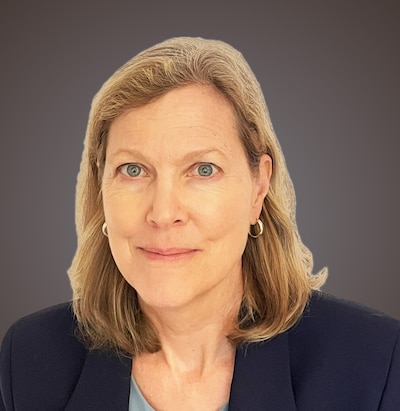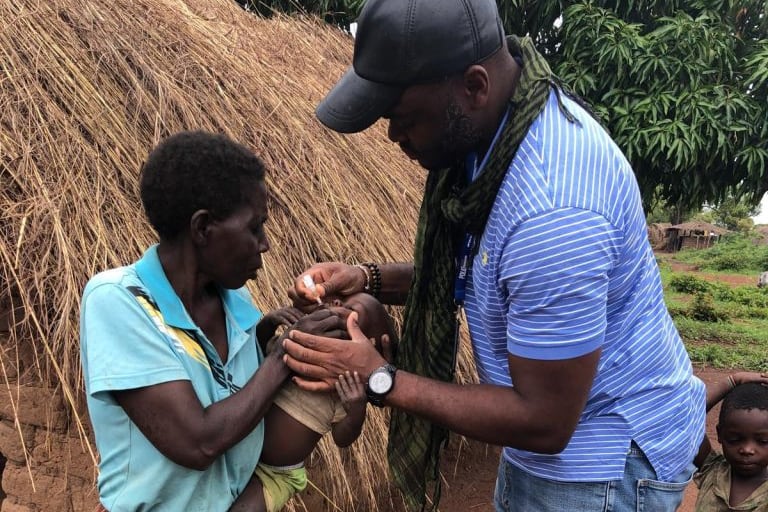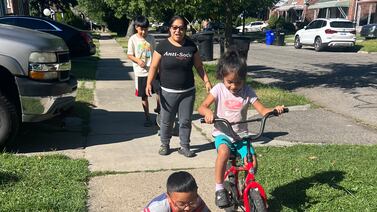Public health, explained: Sign up to receive Healthbeat’s free Atlanta newsletter here.
The Task Force for Global Health’s Center for Vaccine Equity, based in Decatur, has a worldwide view of efforts to eradicate infectious diseases like polio, measles, and hepatitis B. With recent declines in U.S. childhood vaccination rates, the center has work to do at home, too.
Dr. Alicia Fry, the center’s director, has worked to prevent, monitor, and treat respiratory infections on the local, national and global level — from the Centers for Disease Control and Prevention to the Fulton County Board of Health. The tools of that work — like vaccines and access to them — are often the same anywhere.
Fry spoke with Healthbeat about the center’s work to make it easier for people to access life-saving immunizations, and the challenges to the mission, from war and political strife abroad to misinformation at home.

This conversation has been edited for clarity and brevity.
Could you talk about your public health background? How did you get started working in infectious disease prevention?
I’m an internist with a sub-specialty in infectious diseases, so I always was drawn toward infectious diseases. My work in public health really started when I came to the CDC to be an Epidemic Intelligence Service officer in 1999. I’ve been doing public health for a long time, and I love it.
I was working with a group that worked on bacterial diseases that cause respiratory illnesses. We worked to understand and promote the use of the pneumococcal vaccine … I transitioned to other places in CDC, but I ended up my last 15 years working in the influenza division and focusing on influenza vaccines, antivirals, and epidemiology.
It looks like you’ve done infectious disease work at a global level with the CDC and a local level with Fulton County Board of Health. Can you speak about how those responsibilities overlapped and how they were connected?
The tools to prevent the spread of infectious diseases are really the same — whether you’re a local, county, or state [government], you’re CDC at the national level, or you’re a country anywhere in the world.
First, you want to prevent infection, and we know vaccines are one of the best tools to prevent infection if available. The second tool is surveillance and rapid response to prevent the spread once you detect it.
At a local health level, [departments] work very closely with the schools to assure immunization rates are high and recorded. They also offer free or inexpensive vaccines to make it easy to get children vaccinated, do surveillance, and respond if they detect any cases of certain infectious diseases.
At the global level, the Task Force for Global Health works with local ministries of health in countries around the world to both prevent infectious diseases and other illnesses, and also to detect and respond to them locally. These tools are really used across public health.
Can you tell us a bit about the work the Center for Vaccine Equity does?
The Task Force for Global Health was founded 40 years ago specifically to reduce childhood mortality by promoting the use of vaccines, help low- and middle-income countries have access to vaccines, and improve [those countries’] vaccine coverage. Over time, it’s evolved to work on other diseases, some of them without vaccines. The Center for Vaccine Equity was founded in 2011. As the task force grew, the vaccine work became more concentrated in one center.
We have several different programs in the Center for Vaccine Equity, and our overall goals are to prevent infections and work toward the elimination of some [diseases], such as polio or hepatitis B, and to improve childhood vaccine coverage. We also have a program that works on educating [United States] parents, providing vaccine information to parents and working toward decreasing misinformation out there.
Most of our work is international, but we also have some domestic work. We touch on both.
Inherent in the name Center for Vaccine Equity is that you are addressing inequity. Can you speak about global vaccine inequity?
This goes back to when the task force was founded. Poor access to vaccines — whether it’s an inability to purchase them because they’re too expensive, or not having the infrastructure in a Ministry of Health — all of those things create inequity. When you work to reduce inequity, you’re trying to touch on all those different aspects.
There are many other partners working on this to reduce inequity by improving access to vaccines and lowering costs. It’s not just working to get vaccines in countries but also to help local health departments set up their immunization programs so they can deliver vaccines to children, monitor vaccine coverage, and do disease surveillance.
By working with local partners to help them establish those systems, you’re improving their ability to have higher vaccine coverage for their children. And you’re reducing inequity.
Why should Americans care about vaccine availability around the world and global public health in general?
Infectious diseases don’t really know boundaries. If an unvaccinated person either travels to a country where there is an infectious disease circulating freely in the community and then travels back home, they basically import that infectious disease to that country. Then [there’s risk] for anyone who’s susceptible, which includes people who aren’t vaccinated, but also children who are too young to be vaccinated.
But the other reason is because vaccines save lives. Globally, vaccination has prevented millions of deaths, especially in low-income countries. If we only look at measles vaccinations, 60 million deaths among children have been prevented between 2000 and 2023. Now, despite these great accomplishments, we still need to work to ensure that all children have access to and are vaccinated with these life-saving vaccines.
During the Covid-19 pandemic, there were some disruptions in health services globally and in the U.S. that affected vaccination rates. The drop in immunization rates was most notable in low-income countries. Many partners, including the task force, have tried very hard to improve vaccine rates, but those rates have stagnated.
And we’ve already seen the consequences of this. During 2023, the number of measles cases more than doubled globally, and the number of outbreaks has increased. This means that we really need renewed efforts to prevent measles globally, and we need to remain vigilant and protect our children here in the U.S. by maintaining a high vaccination level.
What has changed in global infectious disease public health work since the Covid-19 pandemic began?
In the U.S. and globally, we’ve seen a drop in immunization rates. During the height of the pandemic, that was likely due to health clinics closing and resources being diverted to control the pandemic. But since Covid has decreased, we haven’t seen a great increase. We’ve seen a continuing lower vaccine coverage.
Part of that is thought to be due to misinformation about vaccines. We know in the U.S., there’s certainly some misinformation about vaccines, and that’s affecting pediatric vaccination. The slow, downward trend is very concerning, so working to provide good information out there is new for the whole global community.
Vaccine misinformation has been around for a long time. I think with social media, it’s just more widespread. That is new since Covid, and that’s something the global and U.S. vaccine communities need to work on.
What are the biggest threats to equitable vaccine distribution?
I think it’s a combination of things. There are still parts of the world where there’s war and political strife so that the health system is not functional in the country. For example, in Gaza, vaccine coverage dropped because the infrastructure for vaccination was destroyed during the war. There’re climate disasters, flooding, and other things where people are displaced. Then the normal health infrastructure gets disrupted, and you have children who are not vaccinated and vulnerable. There’s a lot of reasons why we continue to have children who aren’t vaccinated around the world.
In places that have good infrastructure and are unable to reach high vaccine coverage, misinformation plays a role. Also, vaccines are still costly, and the global community is still working hard to make sure there are vaccines that are accessible to all countries.
From global health to domestic health: You touched on the misinformation aspect, but are there other factors at the local, state, and national levels that impact the metro Atlanta vaccination rates?
State legislation for school immunizations is very critical. All 50 states have immunization laws. These laws were put in place in the [19]70s and early ’80s because even after the measles vaccine became available, there were still cases of measles. Some of those kids had swelling in the brain and pneumonia. There were still deaths.
These school immunization programs really increased vaccine coverage, and that [created] a recognition around the country for the need for this. That is one of the main tools state and local health departments have to ensure they have high vaccine coverage — because it mobilizes the local health department to work with the schools and mobilizes the schools to educate the parents.
There is misinformation out there that is likely contributing to lower vaccine coverage for children, and it’s really dangerous for their health. Because it makes them susceptible if an infectious disease like measles or pertussis is introduced to the school.
One of our programs specifically works to inform families about vaccines and has a very helpful webpage that parents can go to get more information. [And] there’s a group of people whose primary job it is to take care of children and keep them healthy, and that is nurses and doctors in the pediatric office and local health clinics. If parents have questions about vaccines, they should ask those people who work hard to keep children healthy about the vaccine. Getting information from the right sources is probably an important way to counter some of the misinformation out there.
As we enter into a new federal administration, what lessons from the past can help continue our efforts to prevent infectious disease spread?
The tools to prevent infectious disease spread have been known for decades, and the U.S. has really worked hard to reduce infectious diseases in children. Our high vaccine coverage of children has really been a source of pride. That is because our pediatricians are great at working with parents so they understand how important vaccines are, and then the local and state health departments promote that. Hopefully, we can look historically at why vaccines are important so we don’t have to experience what low vaccine coverage means for our children.
I just hope we can continue to have a good discourse. It’s conversation, discourse, and being willing to remember those days before we had high vaccine coverage and what that meant for our children.
What’s your hope for the future of vaccine equity, both globally and domestically, for the next 10-20 years?
My hope would be that we can move toward high vaccine coverage, especially for some of the more infectious diseases like measles, globally. That we continue to move toward polio, measles, and hepatitis B eradication — all of these goals that were set by the [World Health Organization] and the World Health Assembly. Working toward everybody having a chance at a healthy life. I hope that we continue to move toward that and not away from it.
Allen Siegler is a reporter covering public health in Atlanta for Healthbeat. Contact Allen at asiegler@healthbeat.org.






